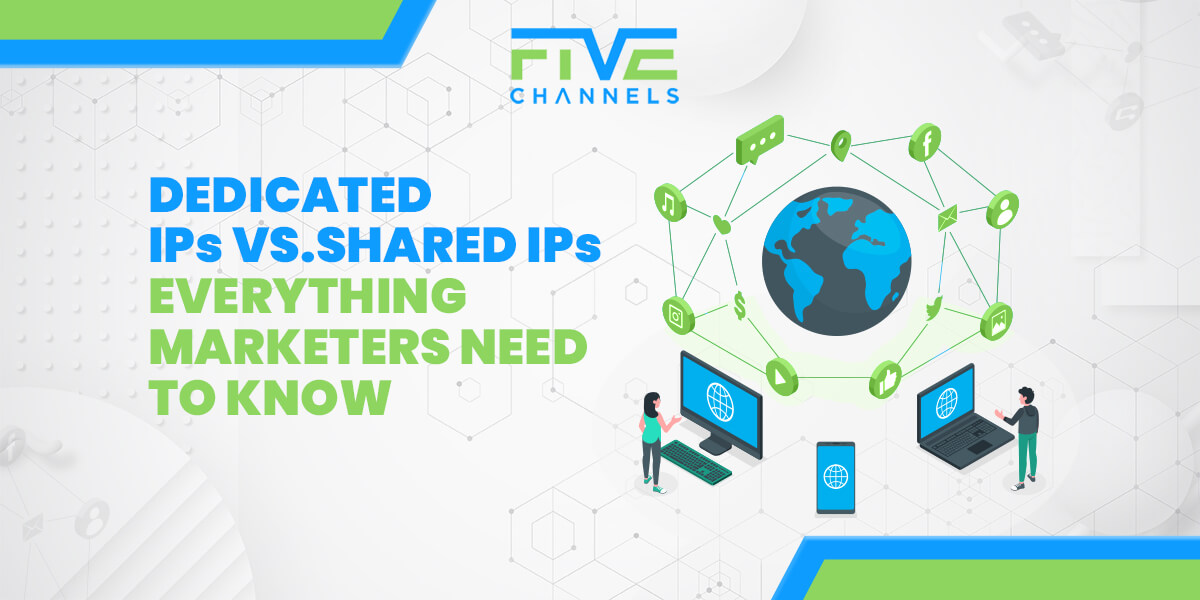As a marketer, you may have heard talk about how to use IPs. As you get into some of the more technical aspects of search engine optimization, it becomes difficult to distinguish facts from myths. Whether to choose a dedicated or shared IP address is one of those technical issues.
In their early stages, many companies start by using WordPress with a shared IP. As they grow, however, there comes a time to decide whether to switch to a dedicated IP address.
All businesses must allocate resources wisely, show stability, and build their brand reputation to promote sustainable growth. Your choice of a dedicated or shared IP is part of these responsibilities, but not in the way that you might think.

Understanding Dedicated IP Addresses
Things get hairy for marketers when you start talking about IP addresses. After all, an IP address is an IT issue, right? Well, yes and no.
Any marketer worth their salt knows that a top-level domain (TLD) is a must. However, just because you have a top-level domain doesn’t mean that you have a dedicated IP address.
By sharing IP addresses, sites such as WordPress allow everyone from casual bloggers to small-to-midsized businesses to share site resources. It’s impossible to do this cost-effectively if every top-level domain owner has dedicated server resources, thus IP sharing.
Before diving in into IP addresses and SEO, think ahead a little bit. At some point, if not already, you may need to deploy email marketing.
When it comes to email marketing, spam is a big problem. As a result, internet service providers (ISPs) monitor network activity to make sure that you’re not using their servers to send spam emails to poor, unsuspecting consumers.
A dedicated IP address is great to have if you send a large volume and frequency of email advertising. By complying with best practices for email marketing, you’ll build a positive reputation with your ISP that’s tied to your dedicated IP address.
Why You Should Know the Difference Between Dedicated vs. Shared IPs
You might have a TLD domain, but if you’re not aware of the status of your IP address, it’s a good chance that you share resources with other domain owners.
Smaller enterprises, however, can take another approach, and often do by default. Many small-to-midsized advertisers don’t produce enough email marketing volume to build a reputation.
Therefore, SMBs can enjoy the benefits of IPs by sharing an address with other companies that use ethical email marketing practices. If, for example, you send less than 50,000 emails monthly, a shared IP address most likely works fine.
Alternatively, large email marketers are better off with a dedicated IP address. This way, they don’t have to worry about inheriting the reputation of brands with different patterns, styles, volumes, and audiences.
In a worst-case scenario, an ISP will blacklist an entire IP range if a site owner in their group sets off spam red flags. That range consists of 255 IP addresses. For this reason, you need to find out what other companies share your IP address if you take that route.
As your company starts getting deep into marketing, your digital reputation starts with establishing an IP address. It’s a business commodity that you must treat with respect.
Your IP address is a part of your brand reputation. It’s essential to configure it properly and protect it.
Dedicated IPs vs. Shared IPs: What’s the Difference?
With the email IP example in mind, it helps to understand a few things about IP addresses when you’re trying to decide whether a dedicated or shared IP address is right for your enterprise. A dedicated IP address is linked solely to your domain. In this instance, you’re the only person who uses that IP address.
However, shared IP addresses are associated with multiple domains. In other words, your domain reputation is not based only on your activities, but also the activities of the other domain owners who share your IP address.
One benefit of a dedicated IP address is that you have complete control and responsibility for it. You don’t have to worry about someone messing up your domain reputation. A malicious actor or unscrupulous advertiser can ruin your domain reputation easily with their activities.
Also, it’s easier for you to fix problems with IP issues when you lease a dedicated IP address. If you use a shared IP address, it can prove difficult for IT professionals to find a problem and fix it. With a dedicated IP address, however, you only have to maintain your domain.
Some ISPs don’t allow shared IPs. Because of this, a shared IP address is not a good choice for all organizations. However, some enterprises can benefit from sharing.
A Dedicated IP is Great for Branding – for SEO, Not So Much
There’s been a lot of discussion among marketers about this matter. Yes, there are differences between dedicated and shared IP addresses, but it doesn’t matter for most website owners today.
When someone types in your TLD, they’re directed to your website. In most instances, that’s sufficient.
It wasn’t always this easy for service providers, however. In the past, you could not install an SSL certificate using a shared IP address. Now, service providers can install multiple security certificates on a single IP address, so that’s no longer an issue.
Today, both dedicated and shared IP addresses are secure. If you have an on-site server, for example, the security of that hardware is more of an issue than the security of your IP address.
Touching on the email example again, marketers understandably wonder if an IP address can affect SEO ranking. The short answer is no.
It doesn’t matter whether you use a shared IP address or a dedicated IP address when it comes to influencing your ranking in search engine results pages (SERPs). At least, that’s the word according to authoritative Google representatives such as John Mueller, a senior trend analyst at the company.
What Mueller does cite as a problem is a lack of original content. This issue arises starting with the days where black hat SEO practitioners would create domains with duplicate content. The goal here was to target keywords for inbound links.
When this unethical method still worked, it was cheap and easy to do it using shared hosting. Because sites shared a server, they also shared an IP address with these particular black hat practitioners.
This scenario is likely where the idea that a shared IP address can affect SEO ranking. However, this belief is unfounded in today’s SEO environment.
Working Your Way Up from the Bottom
Before companies, speculators and consumers purchased every resource imaginable, fresh IPs were a priceless resource for hackers. Back then, there was no such thing as a sending reputation.
Email service providers didn’t track sender activity. What this meant is that anyone could send any volume of email to as many people as they like, despite the quality of their messages. This loophole ushered in the golden era of spam.
Fortunately, that was a long time ago. Since then, a couple of things happened to make this seemingly never-ending well run dry.
To begin with, new IPs have gone the way of the dodo bird. Which is to say, they have gone extinct.
There are no more IPs left. This circumstance, however, presented a problem as the Internet of Things (IoT) started stretching its mighty arms.
As a result, engineers had to develop an entirely new IP schema called IPv6. With the schema, every device in the IoT universe can have its own IP address, supporting communication and making them uniquely identifiable.
Now, a new IP address must prove its merit. Users of a new IP address can no longer send emails willy-nilly. In other words, a new IP must build a positive reputation over time before an ISP will allow it to send emails at volume.
If you need one and you’re lucky enough to get your hands on a new IP address, you’ll have to prove yourself. If you never send enough communications for an ISP to assess your qualities, you will ultimately remain a risk in the eyes of the service until you do so.
Color Between the Lines: Stay on Google’s Good Side
There is a way that the activity of your IP roommates can affect your ranking. If a questionable domain owner practices cloaking, you can get dinged. This possibility highlights the importance of knowing your IP address bunkmates.
Cloaking is a form of bait and switch. Imagine, for example, that a website owner displays targeted content to SERPs that contain free games. The SERP would, in turn, send organic traffic that includes people who want to have some digital fun for free.
However, if it’s a cloaked IP, internet users may find out that they’ve navigated to a casino when all they wanted to do is play a free game. In this example, the domain owner intentionally tricked the SERP into thinking that the content was for free games when it’s really a casino.
This scenario creates a horrible experience for internet users. What’s more, it makes the SERPs look bad. The SERPs don’t like to look bad and will punish you for this.
Remember, the email example? If you’re within a class of IP addresses, a SERP may penalize you, along with your other 254 shared IP buddies.
Google, for instance, has a specialized team that has one job, monitoring cloaking.
What’s the punishment? If you’re caught cloaking, Google will remove you from its search index completely. Proof, you’re gone.
Fortunately, Google manages this problem with a human team rather than an algorithm. For example, your site may direct users from different geographic regions to pages with different languages.
In this instance, you won’t get penalized for cloaking. For now, it’s unlikely that a computer can make this distinction.
So, What’s Next?
If you do a little digging and find that you have a shared IP address, don’t lose sleep worrying about issues like cloaking. To execute cloaking fraud, a website owner must deliver specific content to the IP address of a search engine crawler.
However, this only works if the crawler uses the same IP address to identify itself. Because of this, most search engine crawlers now use a dynamic IP address to thwart cloaking.
What’s more, Google doesn’t mind if you optimize your landing pages for people who speak various languages. What it does mind is when website owners tell Googlebot their pages one thing, and it’s really something else.
Nevertheless, it’s a good thing you’ve given this topic some thought. Now, you’ve learned that you must pay attention to what’s going on if you use a shared IP address. You now know how someone else’s online activity can affect your digital assets.
There’s not a lot that a dedicated IP address does for SEO ranking. Also, there’s minimal risk that spam or cloaking on a shared IP will affect you because ISPs and SERPs work around the clock to stop this kind of activity. For most malicious actors, it’s not worth it – but those who don’t know better may try.
What is important when it comes to strategy for SEO is the basics, like backlinks, keywords, meaningful content and internal linking. Also, remember to create a good SEO title and meta description.
Dedicated Versus Shared: Putting Things in Perspective
Today, you’re more pressed to concern yourself with page load time and mobile compatibility rather than dedicated IPs vs. shared IPs. Instead, focus your energy on publishing quality content and building website authority. None of these activities have anything to do with your IP address.
SERPs such as Google will continue to update their algorithms to improve the user experience. Moving forward, it looks like SEO experts will have to follow a rule of thumb, “What’s in it for the user?” In a nutshell, that’s the future of SEO.
Stay Sharp, Stay Informed: SEO is Always Changing
In the digital domain, the lion’s share of traffic goes to the top results in search engines. Gaining this coveted spot is the holy grail of search engine optimization. Why? Because only a small percentage of internet users bother to scroll down and only 8% navigate to the next page.
If you’ve been trying to weigh the benefits of dedicated IPs vs. shared IPs for your organization, Five Channels can help. Our experts will show you how to boost your traffic, leads and sales using ethical SEO techniques.
Contact us today for a free digital marketing strategy review and start winning the SERP battle.
Owner and Chief Marketing Officer, Jason Hall, and his team specialize in creating brand awareness / traffic and lead generation / marketing funnel and conversion optimization, while utilizing the appropriate marketing channels available within your industry. With diverse clients throughout the world, Jason's team is well connected within many industries to assist with your marketing strategies. With no long term contracts and various levels of service, Jason's team will increase the quality of your online traffic, leads, and sales.
About the author...
Located in the heart of the Emerald Coast - Destin, FL, founder and Chief Marketing Officer, Jason Hall, and his team specialize in creating brand awareness / traffic and lead generation / marketing funnel and conversion optimization / and PR campaigns, while utilizing the appropriate marketing channels available within your industry.
With diverse clients throughout the world, Jason's team is well connected within many industries to assist with your marketing strategies. With no long term contracts and various levels of service, Jason's team will increase the quality of your online traffic, leads, and sales.









